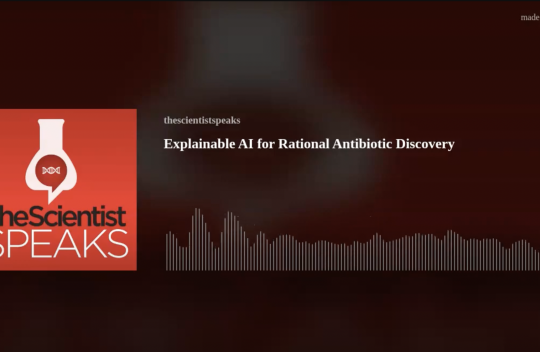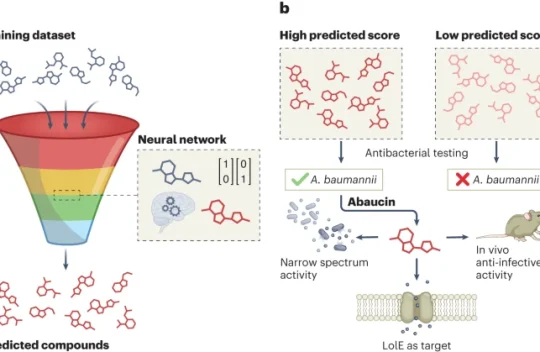Tag: abaucin

Explainable AI for Rational Antibiotic Discovery
Researchers now employ artificial intelligence (AI) models based on deep learning to make functional predictions about big datasets. While the concepts behind these networks are well established, their inner workings are often invisible to the user. The emerging area of explainable AI (xAI) provides model interpretation techniques that empower life science researchers to uncover the underlying basis on which AI models make such predictions.In this month’s episode, Deanna MacNeil from The Scientist spoke with Jim Collins from the Massachusetts Institute of Technology to learn how researchers are using explainable AI and artificial neural networks to gain mechanistic insights for large scale antibiotic discovery. Learn more

Jim Collins: Discovery of the First New Structural Class of Antibiotics in Decades, Using A.I.
Jim Collins is one of the leading biomedical engineers in the world. He’s been elected to all 3 National Academies (Engineering, Science, and Medicine) and is one of the founders of the field of synthetic biology. In this conversation, we reviewed the seminal discoveries that he and his colleagues are making at the Antibiotics-AI Project at MIT. Learn more
New Class of Antibiotics Discovered Using AI
Antibiotic resistance is among the biggest global threats to human health. It was directly responsible for an estimated 1.27 million deaths in 2019 and contributed to nearly five million more. The problem only got worse during the COVID pandemic. And no new classes of antibiotics have been developed for decades. Learn more
What Am I Thankful for This Year? Amazing Scientific Discoveries.
I’ll wager that the event of 2023 that will change our lives the most in coming years is not the sighting of a Chinese spy balloon, the failure of Silicon Valley Bank, the fall of Kevin McCarthy’s speakership or any of the other eruptions that transfixed us this year.More likely, the event that’s judged most transformative will be some scientific or technological advance that only a handful of people know about right now — because that’s how things almost always go. The first time the word “transistor” appeared in print was in an article in The New York Times in 1948, on Page 46, following a report on two new radio shows, “Mr. Tutt” and “Our Miss Brooks.” I think we can agree that the transistor has had more impact on our daily lives in the 75 years since than either of those bits of entertainment. Learn more

Antibiotic identified by AI
Computational approaches are emerging as powerful tools for the discovery of antibiotics. A study now uses machine learning to discover abaucin, a potent antibiotic that targets the bacterial pathogen Acinetobacter baumannii. Learn more
Using AI, scientists find a drug that could combat drug-resistant infections
The machine-learning algorithm identified a compound that kills Acinetobacter baumannii, a bacterium that lurks in many hospital settings. Learn more
